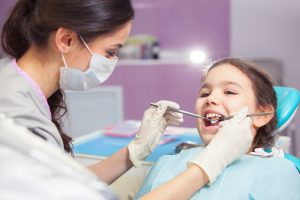How To Help Your Child Develop Good Dental Habits
How To Make Losing A Tooth Fun For Kids
May 24, 2019What Foods Are Good For Children’s Teeth?
June 13, 2019
One of the first things that young children learn how to do is take care of their teeth. Good oral health habits should start at an early age, as plaque can develop as soon as a baby’s first tooth grows in. But brushing and flossing teeth are not the only habits that protect and strengthen young teeth; scheduling regular dental fluoride treatments and receiving dental sealants are other ways that you can help your child develop good oral health. Find out what else you can do to protect your child’s oral health with these good dental habits!
Importance of Teeth
Baby teeth begin erupting within the first few months of life, and are important for achieving good oral health. These teeth help children to speak, eat and chew, and need to be protected. Most children will develop a full set of 20 teeth by the time they turn 3 years old. As soon as your child’s teeth begin erupting, they can develop tooth decay. For infants and toddlers, tooth decay is most often described as baby bottle tooth decay, in which the upper front teeth, along with others, develop decay from keeping bottles in their mouth for long periods of time, which allows acid from sugar in milk or juice to accumulate on their teeth. This can become so severe that some teeth need to be removed to protect the child’s oral health. Without these teeth, children can struggle learning how to speak, eating well and other activities. To protect your child’s teeth, it’s important to teach them good dental habits at a young age so that they can develop and maintain good oral health throughout their lives.
Habits To Include In Your Child’s Daily Schedule
The American Academy of Pediatric Dentistry recommends that a child has their first dental checkup within six months of their first baby tooth erupting, and no later than their first birthday. Even if their teeth do not have decay and everything seems “normal”, it’s important for them to receive an evaluation to discover any hidden issues and start them on a good oral health regimen. Another important aspect of protecting your child’s teeth is monitoring their food intake and making good food choices. Preparing healthy snacks for them to eat on the go, in the car or when they get home from school will strengthen their teeth and give them sustaining energy that will help them continue to grow healthy and strong. Teaching your child how to properly brush and floss their teeth at an early age will also prevent cavities from forming, and will keep their smiles brilliant. Make sure to brush with toothpaste that includes fluoride, which helps tooth enamel become more resistant to decay. Fluoride is naturally found in all water sources, like lakes, rivers and oceans, and is added to community tap water, mouth rinses and toothpaste. Too much fluoride can be detrimental to a child’s health, however, so their brushing routine should be monitored by a parent to ensure that they don’t swallow their toothpaste.
Dental sealants are recommended for young children, as well, to prevent cavities. Sealants protect the narrow grooves on teeth from accumulating food particles, which leads to cavities. Even though brushing cleans the majority of a tooth, it can miss some of the pits that are naturally found on teeth, and bacteria loves growing there. Dental sealants cover these grooves and pits, which prevents food from getting stuck and bacteria from growing. After a child’s first dental visit, make sure to schedule regular visits with their dentist every six months for a deep cleaning and exam. Dental exams and cleanings allow dentists to identify problems early on and treat them right away. Especially if your child is at-risk for developing dental issues, it’s extremely important that they consistently visit with their dentist.
The First Dental Visit
At Hardy Pediatric Dentistry & Orthodontics, we offer free infant dental exams for patients 18 months and younger! The first dental exam is essential in identifying any underlying issues and monitoring your child’s tooth development. During this visit, your child will sit in your lap with their legs wrapped around your waist, and then will be lowered onto the dentist’s lap while you hold onto their tummy. This position allows the dentist to examine your child’s mouth without your child leaving the comfort and security of your lap. Using a soft toothbrush and a mirror, the dentist will examine the inside of your child’s mouth and each individual tooth to find decay or cavities. Some children may be fussy or cry during the exam, but rest assured, the exam is simple and gentle. Without the exam, your child cannot be evaluated so it is important to continue on even if your child is upset.
Meeting With The Dentist
Good dental habits are developed early on in a child’s life, and at Hardy Pediatric Dentistry & Orthodontics, we are experienced in helping families develop good oral health routines and protecting young children’s teeth. If your child is due for their first infant dental exam or just needs a checkup, call our office at (720) 887-6003 to schedule an appointment. Your child’s oral health is important to us, and our talented staff can help them receive optimal health and wellness. Call today for more information!